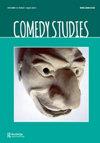#CybillToo?: how a feminist sitcom (almost) exposed Hollywood’s dark secrets
Q1 Arts and Humanities
引用次数: 2
Abstract
Abstract The sitcom Cybill (CBS 1995–1998) is loosely based on the real-life experiences of its feminist star and executive producer, Cybill Shepherd. The show thus has the extraordinary potential to relate the experiences of a Hollywood actress, operating within a singularly influential apparatus in the creation of dominant ideologies, including representations of women. This ‘belly of the beast’ set-up suggests an abundance of possibilities for the woman buffoon, trickster or thief of language to tell her thus-far censored, inside story, but within a medium and textual format that are themselves significantly controlled by, and instrumental in perpetuating, that very same machinery. Yet this sitcom was produced in the nineteen-nineties, a decade characterised by apolitical, postmodern irreverence. This article will assess the sitcom’s integration of postmodern, conservative and feminist discourses by conducting a critical discourse analysis, as formulated by Norman Fairclough, of one episode. The episode is one of two in which the show depicts Hollywood producers requesting sexual favours in return for employment opportunities, two decades before the practice provoked international outrage and brought about the formation of the #MeToo movement. The episode overall adopts a morally dubious positioning in its portrayal of Hollywood realities. However, as will be argued, this very postmodern ambiguity enabled the sitcom to represent and denounce long-established ‘casting couch’ practices, if in a cursory and trivialising manner.#CybillToo?:一部女权主义情景喜剧(几乎)揭露了好莱坞的黑暗秘密
摘要情景喜剧《赛比尔》(CBS 1995–1998)大致基于其女权主义明星兼执行制片人赛比尔·谢泼德的真实经历。因此,该剧具有非凡的潜力,可以讲述一位好莱坞女演员的经历,她在一个具有特殊影响力的机构中运作,创造主导意识形态,包括女性形象。这种“野兽的肚子”的设置表明,女性小丑、骗子或语言窃贼有很多可能向她讲述迄今为止受到审查的内幕故事,但在一种媒介和文本形式中,这种媒介和文本格式本身受到同样的机制的重大控制,并有助于使其永久化。然而,这部情景喜剧是在20世纪90年代制作的,这十年的特点是不关心政治,后现代的不敬。本文将通过对诺曼·费尔克劳夫(Norman Fairclough)提出的一集的批判性话语分析,来评估这部情景喜剧对后现代、保守和女权主义话语的融合。这一集是该剧描述好莱坞制片人要求性帮助以换取就业机会的两集之一,20年前,这种做法引发了国际愤怒,并引发了#MeToo运动。这一集对好莱坞现实的刻画总体上采用了道德上可疑的定位。然而,正如人们所说,这种非常后现代的模糊性使这部情景喜剧能够代表和谴责长期以来的“选沙发”做法,即使是以一种草率和琐碎的方式。
本文章由计算机程序翻译,如有差异,请以英文原文为准。
求助全文
约1分钟内获得全文
求助全文
来源期刊

Comedy Studies
Arts and Humanities-Literature and Literary Theory
CiteScore
0.60
自引率
0.00%
发文量
26
 求助内容:
求助内容: 应助结果提醒方式:
应助结果提醒方式:


